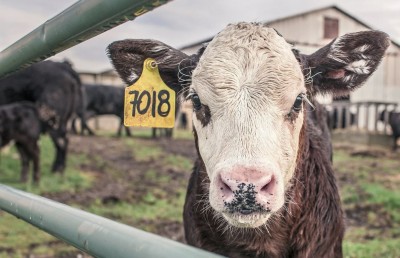So, What Adds Value to a Beef Calf?
Amy Barkley, Livestock Specialist
Southwest New York Dairy, Livestock and Field Crops Program

With the costs of doing business going up, farms that raise beef calves need to take steps to help increase the return on investment from their feeders. This can be achieved through pre-conditioning, or setting their animals up for success when moved to the feedlot. The move to the feedlot from a pasture-oriented home is a huge change, and while there will naturally be depressions in rate of gain, there are also chances for increased illness and death of animals that are not pre-conditioned. Noone wants an animal to die while in their care - both from welfare and financial standpoints. While some market channels don't pay high premiums for pre-conditioning, others will because they understand the value added by the farmer from birth through the pre-weaning period.
What is Pre-Conditioning?
This is a series of protocols taken by the cow-calf operator to get a steer or heifer ready for its new home. These happen over the course of the calf's life. While they can vary from farm-to-farm, they will follow the basic points, below.
Castration:
Bull calves destined for meat production should be castrated. Many times, males and females will be run together in a pen at the feedlot, which means there is a chance that the females could be bred by intact males. Growing fetuses cause finishing efficiency decreases because the heifer is diverting energy to grow a fetus rather than put on muscle and fat.
Best practices for castrating recommend that bulls should be castrated within 2 months of birth to minimize pain and stress. Those animals that are castrated earlier can realize a gain advantage during the post weaning period of up to 0.3 pounds/day.
Vaccinations:
Properly, timely administered modified live vaccinations for common respiratory ailments of cattle (at minimum) are something that buyers look for. The movement from your farm to the final feeding destination is stressful, and even more so when the animal is sent through an auction and/or is grouped with other cattle to make a lot or truckload. Increases in stress decrease the animal's immune system, resulting in increased incidences of respiratory illness, which will decrease rates of gain and can lead to death if severe enough. Working with your veterinarian to provide a robust vaccination program will go a long way to keeping your cattle healthy for their lifetimes.
Don't have a vaccination protocol yet? The New York State Cattle Health Assurance Program provides veterinary advisors that will work with you and your herd veterinarian to create a robust disease prevention program. This program is provided free of charge, and helps to cover one visit from your herd veterinarian annually.
Weaning:
Cattle that are weaned are better prepared for the changes in diet that a feedlot delivers and have a decreased chance of getting sick when they reach their new home. Complete weaning is best. That is, weaning the calf 45-60 days before that animal is intended for sale. Buyers from traditional feedlots are pleased when animals enter the feedlot, walk up to the feed bunk, and start eating. This compares with animals that enter the feedlot, pace, bawl for their mother, and don't understand what a bunk is.
Animals that aren't weaned prior to this life transition will experience high levels of stress. They are not only changing environments, but also their social circle, which included their mother, and their diet, which previously included milk. Getting animals used to a feedlot ration (or a purely grass ration if they are moving to a grass-finishing facility) is ideal. Regardless, calves should be completely independent from their mother for those 45-60 days prior to sale.
Deworming:
Feelots are looking for animals that have been dewormed. While on pasture, cattle pick up internal parasites. While they're not picking up additional parasites in a feedlot, they could experience depressions in rate of gain from what they've accumulated while on pasture. Talk with your herd veterinarian to determine what deworming protocol is right for you.
While these are best management practices for selling at auctions or other large sales, there are some direct buyers who may have slightly different requirements for their pre-conditioning needs. Make sure to communicate with your buyer(s) in advance to ensure that you are meeting their expectations. The money received for quality animals with thorough pre-weaning protocols will most times justify the money invested. Also remember that at larger sales, buyers can't read what an animal's received in terms of pre-weaning protocols, so provide documentation of what's been provided; many auctioneers will read out this information prior to selling your lot.
Upcoming Events
WNY Pastureland Conversion & Soil Health Field Day
July 16, 2025
Middleport, NY
Join American Farmland Trust for the Western New York Soil Health Field Day on July 16, 2025, at Zeliff Farm in Middleport, NY, from 9:00 AM-3:15 PM. Learn about pasture conversion, soil health benchmarking, biochar in grazing systems, and best grazing practices. Plus, enjoy hands-on demos with the NY Soil Health Trailer, drones, and cover crops! Check out the attached agenda for more information about the field day and REGISTER HERE. Zeliff Farms is a regenerative beef operation who has recently partnered with AFT on outreach and education to farmers including learning circles and evaluating biochar effects on soil health.
IPM Strategies to Protect Corn and Soybean Seed in NY
July 30, 2025
Hamburg , NY
SWNYDLFC and Cornell IPM are hosting a grower meeting to discuss integrated pest management strategies for protecting corn and soybean seed in New York.
FAMACHA Training for Sheep and Goat producers in Woodhull NY
August 13, 2025 : FAMACHA Training in Woodhull
Woodhull, NY
Join us for a discussion and hands-on training for internal parasite integrated pest management in sheep and goats. Certification is available to all students participating in the workshop.
Announcements
No announcements at this time.





